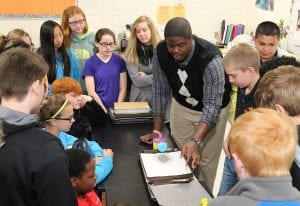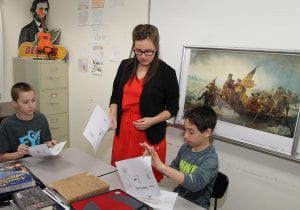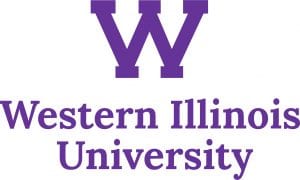Western Illinois Teacher Education Programs: Preparing Future Teachers Since 1902
MACOMB/Moline, IL – When Western Illinois University opened its doors 118 years ago, on Sept. 23, 1902, the school was called Western Illinois State Normal School (WISNS). The school’s primary mission was to train country school teachers, and included a “lab school” for area children in which WISNS teacher education students learned their trade. From Western’s initial beginnings through present day, WIU has prepared thousands of teachers throughout the state of Illinois and beyond for successful careers in the classroom.
According to Greg Montalvo, College of Education and Human Services assistant dean and teacher education coordinator, in recent years to combat the state’s teacher shortage, WIU’s teacher education programs have provided incentives and programming designed to address Illinois’ concerns.

Block student teachers at MJH.
“We are very proud to increase the number of scholarships this year,” Montalvo added. “We recognize the need for teachers in rural schools. The support from the region allows us to add to the network of teachers who want to work in school districts in west central Illinois.”
Great River Teachers Corps
One such program, which began 2018, is the Great River Teacher Corps (GRTC). WIU’s first graduate of the program, Emilee Rains, who graduated in May 2020, is now a second grade teacher at George O. Barr Elementary in Silvis, IL. Western’s GRTC program is meeting the need for more rural teachers by offering teacher education scholarships to students who will in turn work in west central Illinois schools.
“I have always known I wanted to become an elementary school teacher, and I had many great teachers who influenced my decision to start teaching. I was ecstatic when I heard that I received this grant because I had no prior knowledge on the impact rural schools can have on students,” Rains said.
The GRTC includes a service component where WIU students are required to participate in value-added place-based learning activities that focus on issues in rural schools. Administrators of the GRTC program have created partnerships with the Regional Offices of Education, district superintendents and local communities in 22 counties. Students chosen for the program receive between $8,000-14,000 in scholarship assistance through donations, and, in turn, commit to teaching in a rural or small school in a 22-county area in west central Illinois for a minimum of three years after receiving their teaching licenses/certificates.
Diversifying and Strengthening Early Childhood Education Workforce
In addition to such programs as the GRTC, Western is the only four-year public university in the state to recently receive $1.3 million in grant funding from the Illinois Board of Higher Education (IBHE) to strengthen and diversify the early childhood workforce.
The grant is being used to address the shortage and grow the qualified pool of early childhood educators for the rural McDonough County region. Boh Young Lee, project director and WIU associate professor, recruited 14 participants who began their courses at WIU Aug. 31. Upon the project completion in May 2021, the participants will receive their Gateways Infant Toddler Credential (level 2-5).
“It has become exceedingly tough to find highly qualified staff to hire, those who have earned higher levels of ECE and/or Infant Toddler Credentials, in light of the teacher shortage and because of there being relatively few ways to earn such credentials,” said Lee. “There is the

Block student teachers at MJH.
overwhelming need for access to education and training for those interested in the early childhood field. This grant will provide us the means to assist in growing the qualified pool of early childhood educators or the local region, and WIU’s early childhood program can be an even more important entity in preparing high quality early childhood educators ready to implement the most current knowledge and skills for developmentally appropriate practices—a core goal of WIU’s general mission.”
The grants, funded by the federal Preschool Development Grant Birth through Five (PDG B-5) initiative, were awarded in partnership with the Governor’s Office of Early Childhood Development (GOECD). The funds support an estimated 150 students statewide.
Preparing Future Teachers Across the Disciplines & In the Latest Trends
WIU School of Agriculture Director Andy Baker leads a methods class for future teachers, and the COVID-19 pandemic has provided his students the opportunity to learn how to teach content by distance learning. During the Spring 2020 semester, students were assigned agriculture lessons to teach, then converted the lesson to be taught in an alternative format.
“If we were in our traditional, face-to-face format, they would be teaching the lesson to their peers,” he said. “I told them what an opportunity that this pandemic has given to us. This will probably not be the last time that they will have to teach content to students via distance learning, so we need to embrace this opportunity.”
Baker said he has used a variety of technology outlets, such as Zoom and Google hangouts, so students can exchange information with each other. He said the new format has brought more fun into his classes and he has been impressed with how students have adapted to the technology changes and the quality of their work.
WIU senior agriculture major Alicia Flowers, of Curryville, MO, said the learning experience was a new version for everyone involved.
“The real -world experience we got was unbelievable,” she said. “While it has been challenging at times, it has allowed me to learn more than can be taught within the walls of a classroom.”
Rapid Responses to Real World Issues
In October 2020, WIU education professors Gloria Delany-Barmann and Carla Paciotto were awarded a COVID-19 Rapid Response Spencer Foundation Grant for “Teaching for Equity in a Pandemic Hotspots: Reaching Multilingual and Low-income Students in Two Rural Schools.” It was one of only 20 funded proposals, chosen from nearly 1,400 submissions nationwide. Their proposal examines the educational policies and practices implemented by schools and educators serving large, multilingual/multiethnic populations of low-income English Learners (ELs) in hotspot Covid-19 meat packing towns in the rural Midwest during the pandemic crisis of 2020.
“Specifically, the study investigates how, during the Spring 2020 and the following school year, old and new areas of EL educational inequity have revealed themselves during the pandemic, and how rural educators have addressed ELs’ academic, linguistic and social-emotional  needs through remote teaching, while also examining experiences and perspectives of multilingual parents about their children’s access to education,” said Paciotto. “The study will provide extensive data, which will inform WIU teacher education courses and programs with new knowledge and examples on how to improve current English learners’ education policies and practices.”
needs through remote teaching, while also examining experiences and perspectives of multilingual parents about their children’s access to education,” said Paciotto. “The study will provide extensive data, which will inform WIU teacher education courses and programs with new knowledge and examples on how to improve current English learners’ education policies and practices.”
During the COVID-19 pandemic, the foundation sought to recognize the impact of the virus on educational institutions and processes.
Successful Educators in the Field
The Author
WIU alumna and Macomb Community Unit District No. 185 school teacher Adrienne Graham grew up playing school in Maywood, IL, and telling stories with her sister. Now, she’s a first-grade teacher in Macomb who recently published her own book, “The Color of Friendship,” focusing on children learning about diversity.
Graham, who graduated from Western in 2014, with a teacher education degree, and in 2018, with a master’s degree in curriculum and instruction, is in her seventh year of teaching for the Macomb School District. This past year, she decided it was time to tell her own story of growing up in an environment where she looked different from the majority.
“The Color of Friendship” tells the story of Violet Plum, a young girl who lives in the fictional town of Indigoville. Violet loves living in her small town. She especially loves the fact that everyone there is a beautiful shade of purple. One day, Violet’s mom gets a new job, and the two of them must move to a new town, Honeyview Hills. Violet is skeptical about the move, especially when she learns that everyone in Honeyveiw Hills is an interesting shade of … orange. Violet must adjust to her new town, as she learns an interesting lesson in the process.
Graham thought it was important to help children understand more about diversity within their communities and the good experiences that can come from being different.
“Since becoming a teacher, I knew I had to tell my story in a way that children could understand and relate,” said Graham. “I wanted children to know that just because you may move to a new area where no one looks quite like you, that doesn’t mean you can’t make that place your home or make great friends. I have made many great friends in Gary, and in Macomb.”
Graham’s time at Western influenced her, as well.
“My time at WIU was awesome,” said Graham. “My math professor, Bob Mann, was nice enough to offer me the opportunity to work as a tutor in the math department, and I was able to meet so many awesome people because of it.”
Graham was able to do her master’s degree completely online, which helped her be able to maintain her teaching schedule.
Teaching Future Entrepreneurs
Like Graham, WIU alumna Kaylyn Davenport’s educational opportunities and experiences at Western led her down a successful path. Last year, Davenport received the “2019 Outstanding Young Teacher” award from the California Agricultural Teachers’ Association (CATA). A 2014 agriculture education graduate, Davenport is a floral design teacher at Atwater High School in California. Through her classroom work, Davenport started “Falcon Floral,” an in-school floral shop that teaches floral design and managerial and leadership skills. In addition to the CATA award, Davenport has coached three state champion FFA judging teams, including one national championship.
It was during her time at WIU that Davenport said she developed her passion for teaching.
“I felt ready and excited to earn my first teaching position,” she said. “Dr. (Andy) Baker showed me the importance of working hard to learn content, and teach it in the best way possible. My teaching strategies stem from the time spent in my agriculture education courses at WIU.
Using History to Lead the Way
Art Education Alumnus Marc Nelson turned life lessons learned from his grandfather into historical lessons for his middle school students at Kewanee’s Central Elementary School. Nelson, who received his art education teaching certificate from Western in 2006, has been a middle school art teacher in Kewanee, IL since 2008.
Through his classroom art lessons, Nelson is infusing social justice topics into his curriculum to teach students about specific cases of injustice. Students are then encouraged to incorporate and express their feelings about the lessons into the art they create.
“As an artist, I have been inspired to respond creatively to social justice issues since I was a child,” said Nelson. “My grandfather’s family was forced to flee the violence in Northern Ireland in the 1920s, and he and I would often talk about the fear and sorrow of his family’s displacement from their home.
“As an art educator, I want to show my students what artists actually do,” he said. “Beyond learning techniques and materials, artists are visually responding to the world around them. In addition, art is naturally interdisciplinary, and every artist we explore in class is exploring, questioning, celebrating or challenging their internal and external experiences and passions.”
Nelson said he also recommends WIU to his students, and he calls his time at the University “one of the best educational choices I have ever made.”
“My art and education instructors were passionate, talented and dedicated,” he said. “They knew that art is, and should always be, an integral component of our society. My WIU instructors were, and are, inspired professionals, and they pushed me to continually learn and challenge myself.”











